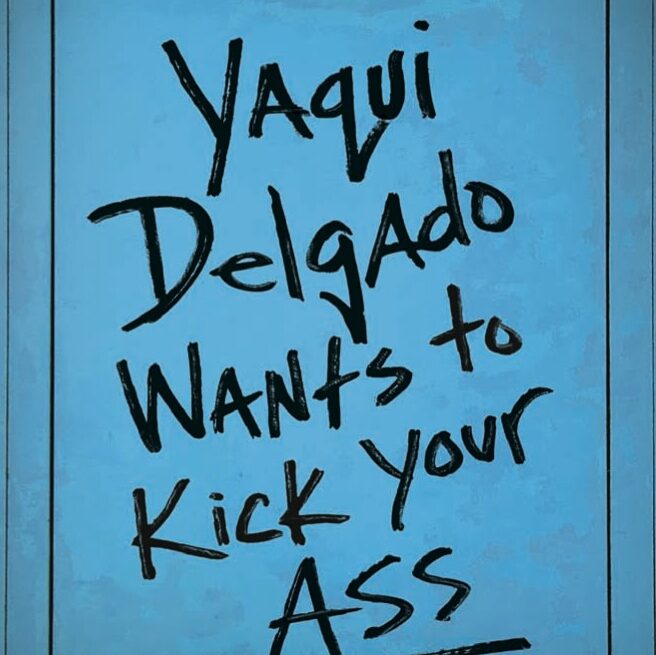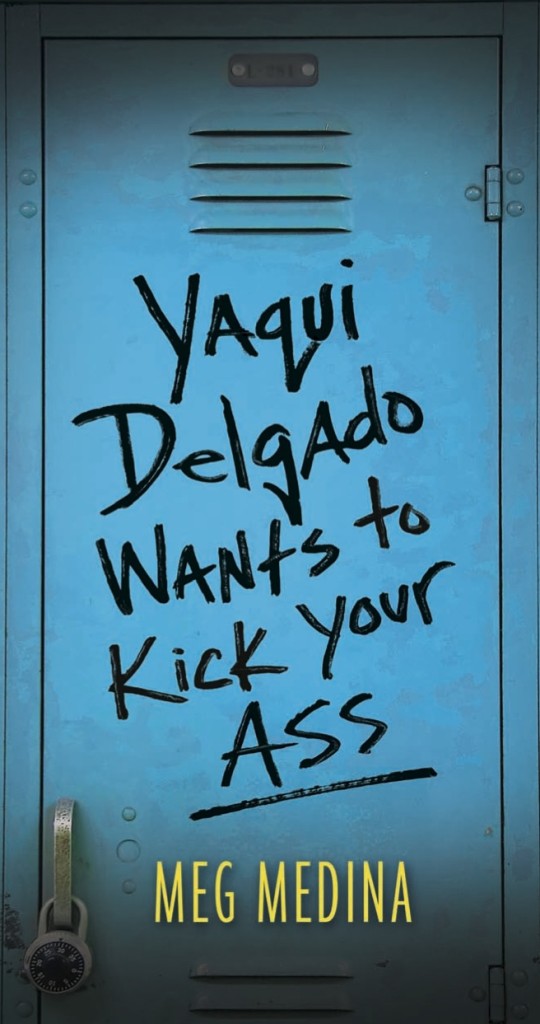
Meg Medina is a Cuban-American author who writes picture books, as well as middle-grade, and YA fiction. The first American citizen in her family, Medina was raised in Queens, New York, by her mother and a clan of tios, primos, and abuelos (aunts/uncles, cousins, and grandparents) who arrived from Cuba over the years. In her words, she was the “fortunate victim” of their storytelling, and she credits them with her passion for tales.
Medina’s work examines how cultures intersect through the eyes of young people. One of the pleasures of reading her work is the discovery of what is unique to Latino culture and what is universal. We can all find ourselves in her stories. Her favorite protagonists are strong girls, which is well evident in her list of published works: Milagros Girl from Away; Tia Isa Wants a Car, for which she earned the 2012 Ezra Jack Keats New Writers Award; The Girl Who Could Silence the Wind, a 2012 Bank Street Best Books; and Yaqui Delgado Wants to Kick Your Ass, which has earned starred reviews in The Horn Book, Kirkus, The School Library Journal, The Bulletin of the Center for Children’s Books, and other journals.
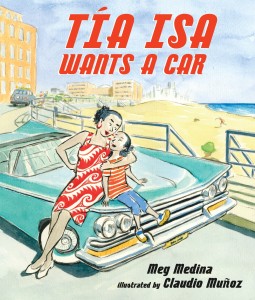
As well as giving Medina’s latest novel a starred review, Kirkus also selected Yaqui Delgado Wants to Kick Your Ass (Candlewick Press, 2013) as a 2013 Best Book for Teens, its reviewer describing the work as “A nuanced, heart-wrenching and ultimately empowering story about bullying…Medina takes what could be a didactic morality tale and spins it into something beautiful: a story rich in depth and heart…. Far more than just a problem novel, this book sheds light on a serious issue without ever losing sight of its craft.”
Library Media Connection described the novel as “gritty,” noting that it “manages to transcend the usual earnest fictional treatment by delivering a protagonist who is more than a mere victim and an ending that rings complicatedly true… This unflinching novel, with its richly developed main character, deserves a place with two other nuanced bully books for teens: Rita Williams-Garcia’s Jumped, a 2009 National Book Award finalist that explores the mindsets of bully, victim and bystander; and Adam Rex’s Fat Vampire, in which a main character confronts her guilt as a cyber-bully.”

In all, Medina’s Yaqui Delgado Wants to Kick Your Ass has won an impressive list of accolades:
• School Library Journal Best Book Selection, 2013
• Junior Library Guild Selection, 2013
• Kirkus Best Books for Teens, 2013
• Cooperative Children’s Book Center “Book of the Week,” Nov. 2013
• YALSA Best Fiction for Young Adults Award nominee, 2013
• Amazon Editors’ Best Books of Best of the Year (So Far), June 2013
• Included in Pinterest Best Books of 2013
• Texas Library Association’s Taysha’s Reading List
HUERGO: What inspires you to write?
MEDINA: Mostly people. It’s amazing to watch how things combust as a result of our frailties and fears. I’m also inspired by the idea of “story” itself, its connecting power, the way a small tale can speak to universal and lasting truths for people of many backgrounds and points of view. And, finally, because I write for young people, I’m inspired by the idea that I’m writing in a genre that readers remember forever. I can easily forget a book I read last month, but I can still name the books that I loved as a kid. Children’s lit is sacred in that way.
HUERGO: How would you describe your drafting and revision process?
MEDINA: It’s a little different every time, but there is always both joy and pain involved. I usually start with a character and a basic problem. Setting, as it turns out, is also key to me—that sense of place and the impact it has on how my characters see themselves and the world.
Once I have those three elements in place, I follow my characters without an outline. Usually, I move the story chronologically in my mind and discover the tale as I go. (My best pre-writing time? Those few minutes before I drop off to sleep.) Unfortunately, this is a really slow way to write, and I often spend lots of time re-writing or deleting sections that, in the end, don’t move the story forward at the right pace. (I write for young people, so pace is crucial.) I’m pretty fearless in the revision process. I’m not afraid to delete characters, add entire new storylines, or make secondary characters into heroes. Whatever makes for the strongest story is what I do. I actually look forward to revision. It’s much easier than the original process of composing.
HUERGO: What is the most important theme in your work? Why?
MEDINA: Strong girls of every age fascinate me, and I never tire of reading or writing stories about girls finding their voice and direction.
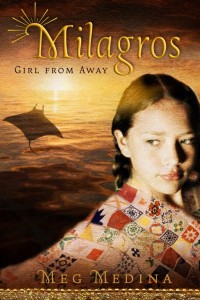
I also write a great deal that is set firmly in Latino culture, particularly bi-cultural Latinos, meaning those who feel as comfortable in American culture as they do in their Latin one. I understand that world from the inside, and it also gives me a chance to provide young readers with more accurate and layered depictions of our families and our lives.
There has been a great deal of conversation about whether there is enough Latino lit, and about how we can better reach Latino readers. In my view, we owe kids books that transcend the Hispanic Heritage Month library book display and become part of general classrooms and libraries. We need books that move beyond food, holidays, and music and look instead at the human experience through the lens of Latino and bi-cultural characters. I hope I achieved that in Yaqui Delgado Wants to Kick Your Ass. Piddy Sanchez is a 16-year-old bi-cultural Latina, but her school world is filled with Anglo friends, Asian friends, other Latinas—the whole tapestry of an urban high school. And her problem (finding herself in the cross-hairs of a bully) is universal, unfortunately. Her culture defines her, confounds her, and strengthens her as she moves through the novel, but her problem is relatable to everyone.
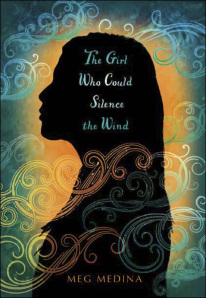
Of course, I’m not alone in this push for more Latino fiction for children. It’s actually a wonderful time to be a Latina author of works for young people. We have giants such as Alma Ada Flor, Margarita Engle, Rafael Lopez and Julia Alvarez; rising stars like Matt de la Peña and Monica Brown; and exciting new voices, too many to name. The challenge isn’t in finding excellent work. It’s in removing barriers and in reshaping the view that multicultural literature is only interesting to multicultural audiences. If my work can help do that, I’m delighted.
HUERGO: Was there a teacher or mentor who influenced your writing or your career as a writer?
MEDINA: I’ve had mentors throughout my life as a writer. I come from a family of storytellers, women who found joy and connection in telling tales of their lives with gusto and detail. I owe my ear for story to my mother, my grandmother and my tías. I had a few key teachers: In third grade, the marvelous Mrs. Zuckerman, who first told me I was a strong writer, and much later at Queens College, Judith Fishman, who offered me confidence and tough assignments.
More recently, my fairy godmother in writing might be my good friend and colleague, Gigi Amateau. Gigi is a wonderful YA author who kindly introduced me to Candlewick Press—a publishing house that I can only describe as a wonderland for authors. Gigi and I live in the same city and collaborate on a number of projects, such as Girls of Summer, a curated summer reading list for strong girls. Meeting Gigi changed my professional life, and it certainly made my personal life richer. When I’m stuck and can’t move forward, she is indispensable to getting me reconnected to my faith in the process.
HUERGO: What advice do you have for writers?
MEDINA: For new writers, it is definitely important to read widely in your genre to get a good sense of how writers solve problems in their own manuscripts. You need a toolbox, after all. Two other nuggets are to attend writers’ conferences and to focus more on craft (in the early stages) rather than on publicity.
For folks further along, I’d say to be good to yourself because sometimes this business won’t be. Writing is hard, gut-wrenching work that can bring you to your knees with self-doubt. It requires suspending disbelief—not only as you write your story, but also as you convince yourself that, yes, you CAN do this.
HUERGO: I’m always curious what writers are working on next. Can you share with us your current project?
MEDINA: I have a picture book in production with Candlewick Press that is due in 2015. The illustrator is the fabulous Angela Dominguez, and the sketches I’ve seen are just so lovely. I can’t wait to see what our collaboration brings. I’m also working on the manuscript for a new Young Adult novel, also from Candlewick, that is set in New York City circa 1977. I’m looking at mental health and family during what can only be described as New York’s worst days.
Author Contact:
